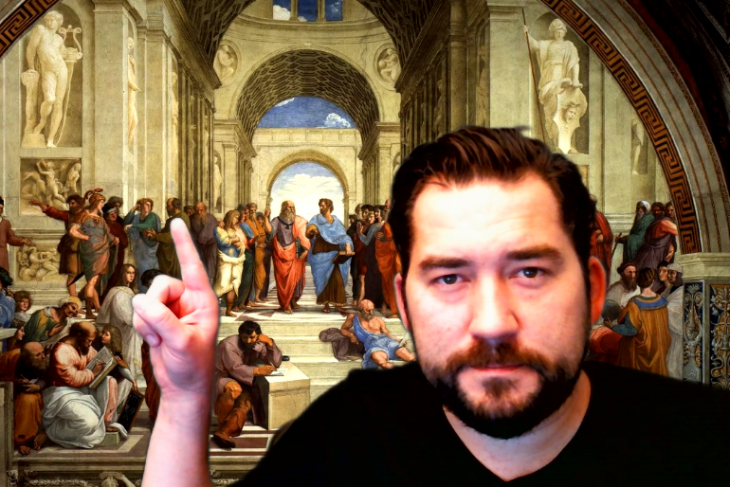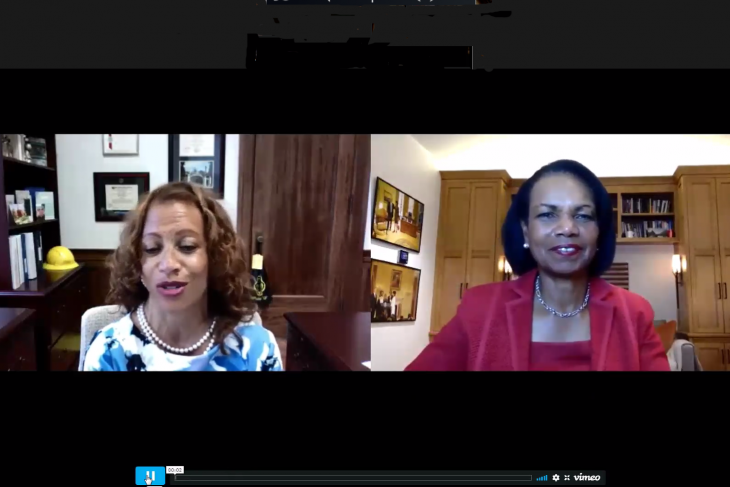DePauw University, like many institutions, had a dilemma: How can it demonstrate for first-year students what they can expect during their liberal arts education when at least some of them will be getting their first university experience from home?
One idea that emerged from brainstorming among DePauw faculty members and administrators is to entice students, whether on campus or remote, with a lineup of guest lecturers who excel as leaders in their fields. When asked to participate, alumni, including several CEOs and an NBA head coach, readily obliged.
More brainstorming resulted in “Leadership and the Liberal Arts: In Crisis and Calm,” a class that 150 students – mostly first-years but also 30-40 sophomores and juniors – are taking this fall. The class, said facilitator Andrew Cullison, director of the Prindle Institute for Ethics and associate professor of philosophy, is not a course on leadership development, but rather one in which “students get introduced to a wide array of subjects and … how those subjects might shed light on our thinking about leadership.”

Cullison asked students to write about the knowledge and skills necessary for effective leadership and to rebut a belief advanced by Socrates (to whom he pointed in Raphael’s “School of Athens”) that only philosophers should be kings.
Dave Berque, vice president for academic affairs, said in an email: “This course provides an amazing opportunity for students to learn how their liberal arts education relates to leadership through special presentations from DePauw faculty members, world-class guest speakers (most of whom are alumni) and small group work under the close guidance of a faculty mentor.”
Whether studying on campus or remotely, students are participating fully in the class. During the first meeting each week, DePauw faculty members present virtually on how their disciplines enhance thinking about leadership.
“If it’s English, we look at a play where the theme is about a failed leader or the rise and fall of leader, right?” Cullison said. “If it’s visual art, we look at a series of paintings, like ‘Washington Crossing the Delaware,’ and what is that painting communicating to us about someone like Washington? If it’s psychology, we look at a couple of psychological studies about what’s going on inside the head of a leader. It’s really an introduction to the liberal arts.”
Jeremy Anderson, assistant philosophy professor, was one of the first of 14 faculty members who will lecture. He “talked a bit about how leaders might have a special duty to acquire knowledge that the average person might not because their decisions impact more people,” Cullison said.

President White moderates as Secretary Rice lectures.

Jon Fortt responds to a comment from Katherine Price '24.
For the second meeting of the week, guests lecture remotely via Zoom and respond to students' questions and comments. Jon Fortt ’98, CNBC co-anchor of “Squawk Alley,” (pictured above, with student Katherine Price '24) lectured Wednesday evening. Former U.S. Secretary of State Condoleezza Rice, the first guest lecturer of the term, spoke in a session moderated by DePauw President Lori S. White. Coming up are lectures by Jim Alling ’83, former chief executive officer of TOMS®; Jeff Harmening ’89, president and chief executive officer of General Mills; Erin O’Brien ’96, a Mayo Clinic rhinologist and surgeon; Brad Stevens ’99, head coach of the Boston Celtics NBA team; James Stewart ’73, Pulitzer Prize-winning New York Times columnist and author of nine books; and Elisa Villanueva Beard ’98, chief executive officer of Teach for America.
For the third class session each week, students meet in small groups – usually three – with a faculty member to discuss a prompt based on previous lectures. The sessions emulate the tutorial model that Cullison, a 2001 DePauw graduate, experienced as a study-abroad student at the University of Oxford.
“The real meat of the course actually is going to be in these tutorials,” he said. “That’s where 60% of their grade comes from. That’s what is going to make this a genuinely liberal arts experience, as opposed to a MOOC, or a massively open online course. So there’s this large online component, but it’s this tutorial, this Oxford-style tutorial, where they get a lot of quality interaction and they do a lot of the things that you would expect them to do in a liberal arts course. They’re writing a paper; they’re presenting it orally to the group. They’re reacting with feedback in real time. They’re engaged in sustained dialogue. I like to use the analogy of CrossFit. It’s like there’s this one activity where they’re exercising all the academic muscles we want them to do in a liberal arts setting.”
“DePauw might be on to something in terms of how we can creatively engage students in an online environment but in a way that’s faithful to the liberal arts tradition.”– Andrew Cullison
Twenty-seven faculty members from 20 disciplines are serving as tutors. Some tutorials are held in person on campus, while others are conducted virtually to accommodate students who are learning from locations spread across 12 time zones.
Regardless of when or where the tutorials are held, Cullison was determined to create the sort of community expected at a liberal arts institution. To that end, he created a website, The Tigers’ Den, which is similar to Facebook or Twitter and encourages interaction and participation by the students, who use it both to meet course requirements and to have fun.
“My two main goals for the course was to do something where we can build some kind of community of learners, and my hope was that this website would help do that,” Cullison said. “Two, make sure that they have something like the classical liberal arts experience, even though it’s online, and my hope is that the Oxford-style tutorials provide them with that. …
“Looking to the future, I think DePauw might be on to something in terms of how we can creatively engage students in an online environment but in a way that’s faithful to the liberal arts tradition. Particularly if (epidemiologist Anthony) Fauci is right and things aren’t going to feel like normal until the end of 2021, we may have to be thinking creatively about how we do this kind of work online and this might be a way to do it.”
Browse other stories
-
Athletics
-
Softball - DePauw Sweeps Doubleheader at Franklin
-
Baseball - Tigers Rally Twice for Win over Franklin
-
Men's Lacrosse - Tigers Top Little Giants to Equal Program Win Record: Gibson Ties Career Goals Mark
More Athletics
-
-
News
-
Professor David Alvarez receives prestigious Fulbright award
-
2024 Total Eclipse at DePauw
-
DePauw University receives $200 million in gifts for transformational liberal arts education
More News
-
-
People & Profiles
-
11 alums make list of influential Hoosiers
-
DePauw Names New Vice President for Communications and Strategy and Chief of Staff
-
President White, 10 alums make inaugural list of influential Hoosiers
More People & Profiles
-
-
Have a story idea?
Whether we are writing about the intellectual challenge of our classrooms, a campus life that builds leadership, incredible faculty achievements or the seemingly endless stories of alumni success, we think DePauw has some fun stories to tell.
-
Communications & Marketing
101 E. Seminary St.
Greencastle, IN, 46135-0037
communicate@depauw.eduNews and Media
-
News media: For help with a story, contact:
Bob Weaver, Senior Director of Communications.
bobweaver@depauw.edu.